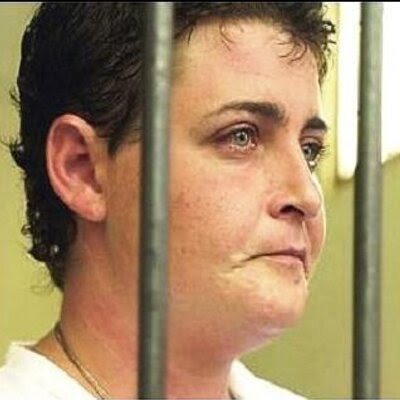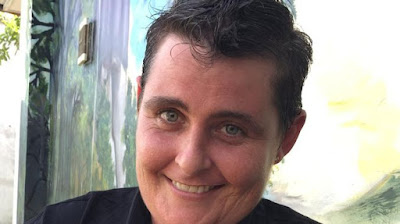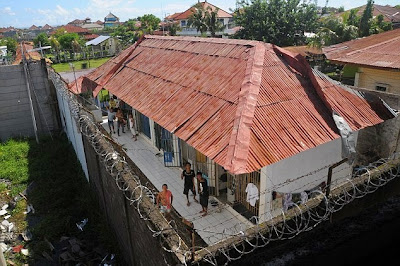BANGLI: The first member of the “Bali Nine” heroin-trafficking gang was released from prison Wednesday after serving 13 years, in a case that caused a huge diplomatic rift between Indonesia and Australia.
Renae Lawrence, 41, the only female member of the group, was arrested in 2005 when authorities caught her with 2.6 kg of heroin strapped to her body as she tried to fly out of the international airport on the holiday island of Bali.
She was initially handed a life term, but her sentence was later reduced to 20 years and then further cut due to good behaviour.
Surrounded by immigration officials and a swarm of media who jostled to get a picture of her, Lawrence left Bangli prison shortly after 5:00 pm (0900 GMT) and got into a waiting car.
It is likely that Lawrence will be deported shortly after her release.
“We’ll put her on a blacklist which bans her for life from ever coming back to Indonesia,” said Agato Simamora, head of Bali’s immigration department.
Earlier Wednesday, Bangli prison chief Made Suwendra told AFP that Lawrence was healthy and ready to leave prison.
“She seems to be happy, but also a bit nervous,” Suwendra said.
Firing squad
The Australian Police Commissioner for the state of New South Wales, Mick Fuller, told The Australian newspaper there were two outstanding arrest warrants for Lawrence and that they will speak to her when she returns to the country.
Reports in Australian media said Lawrence could face arrest once she is back home over a high-speed chase involving a stolen vehicle dating back to just before she was arrested in Indonesia.
Of the nine in the original group, ringleaders Myuran Sukumaran and Andrew Chan were executed by firing squad in 2015, sparking a diplomatic row between Australia and Indonesia, which has some of the world’s strictest drug laws including the death penalty.
Another member, Tan Duc Thanh Nguyen, died in prison in June from stomach cancer, while the remaining five are currently serving life sentences.
Some critics have lashed out at the Australian police for tipping off their Indonesian counterparts about the gang and putting its members at risk of execution in Indonesia.
Dozens of foreigners are on death row in Indonesia, mostly for drugs offences, with executions carried out by firing squad.
High-profile cases like that of Australian Schapelle Corby, who spent more than nine years behind bars for smuggling marijuana into Bali, have stoked concern that Indonesia is becoming a destination for trafficked drugs.
Corby was deported in 2017 after several years of parole.
Foreigners are routinely arrested for drug crimes in Indonesia, including a Frenchman busted in October with nearly four kilogrammes (8.8 pounds) of narcotics including cocaine, ecstasy and amphetamines, while an Australian was arrested in August for allegedly dealing cocaine to Bali holidaymakers.
This summer, a Frenchman detained for 18 years after trying to smuggle drugs into Bali was allowed to leave Indonesia after serving several years of parole in the country.
Source: Agence France-Presse, November 21, 2018
Renae Lawrence the only Bali Nine member to be released early under Indonesia's leniency laws
Lawrence spent close to 13 years behind bars for attempting to smuggle 2.7 kilograms of heroin, that was strapped to her body, from Bali to Australia.
She has been released before her full term of 20 years due to Indonesia's leniency process, where inmates are granted the opportunity to reduce their sentences twice a year during Independence Day and a religious holiday, for good behaviour, among other unclear reasons.
It is also unclear why the other Bali Nine members were not being granted the same leniency.
Narcotics Agency spokesman Sulistiandriatmoko said Lawrence had completed her sentence according to Indonesian law and her deportation would be handled by both the Australian Government and the Indonesian Immigration Department.
"She has no permits or rights to remain in the country, so the matter will need to be addressed by the Immigration Department," he said.
"We will no longer be involved."
'Media circus' to follow Lawrence
Australians who are convicted of crimes in Indonesia have often been followed by scores of journalists who descend on the country, most recently for the deportation of Schapelle Corby in May last year.
The ABC's Media Watch dubbed the coverage of Corby's return to Australia as a "media circus", due to the hawkish nature of Australian media trampling over each other to get the latest scoop.
But little is ever mentioned about the Indonesian perspective or how big a role such a circus plays in the lives of everyday Indonesians.
Mr Sulistiandriatmoko said the attention was something that could not be avoided due to the prominence of Lawrence's release, but it would "indeed become a media circus".
"We can't stop the media covering her release," he said.
"But I guess the circus is not only in Australia, but also in Indonesia."
The costs of staying behind bars
The Indonesian Government has been widely criticised for its tough stance on drug-related crimes.
Dio Wicaksana, from the Indonesian Judicial Monitoring Society in the University of Indonesia, said there were clear inconsistencies in the sentencing of cases in Indonesia due to a lack of clear guidelines.
"There are no official criminal codes to provide sentencing guidance for court judges, while there is one for prosecutors," Mr Wicaksana said.
The Indonesian court system does not determine cases through a jury, instead adopting a judicial panel that deliberates and determines the final sentence.
Lawrence was initially held at Bali's Kerobokan prison, but was later moved to two different jails — the last being Bangli prison in the island's south-east.
Her time in prison has been marked by issues of overcrowding in the underfunded prison system.
There are about 250,000 people in detention across the country — up from 160,000 in 2013 — while the total capacity can only accommodate half of that figure.
Almost 60 percent of detainees are incarcerated for drug-related offences, according to the National Corrections Database.
Local media report that it costs the Indonesian Government and taxpayers roughly $1.50 a day for meals consisting of rice and vegetables for breakfast, lunch and dinner, with occasional protein such as salted fish, tempeh and a boiled egg.
While a seemingly paltry amount, that fee alone has racked up to almost $7,000 for Lawrence's nearly 13 years behind bars.
Indonesia's hard stance on drugs a 'moral issue'
Mr Wicaksana said the Government's hard stance on narcotics was a "moral issue", with drugs seen as a destroyer of the "nation's moral fibre and the younger generation".

"Because the issue of narcotics is seen as tearing apart the nation, it [seemingly justifies] the solution of tough sentences for dealers and the criminalisation of drug users," he said.
Mr Wicaksana said the use of the death penalty, such as in the case of executed Bali Nine ringleaders Andrew Chan and Myuran Sukumaran, was pitched as the effective solution to deter other foreign nationals from bringing drugs into the country.
"At a glance, it looks like you are solving a social issue, when in reality it is not proven whether it is scientific evidence or not," he said.
Lawrence is the only member of the Bali Nine to be released from prison, while five others remain incarcerated in Bali as they were said to not be eligible for the same remission applications.
Bali Nine members Michael Czugaj and Matthew Norman, who were both 18 years old at the time, carried less heroin than Lawrence but had their 20-year jail terms increased to life following their unsuccessful appeals.
However, Mr Sulistiandriatmoko denied allegations that Lawrence received favourable treatment.
"The court decision was made by assessing the role of each member of the Bali Nine's crimes and sentences were determined accordingly," he said.
Source:
abc.net.au, Tasha Wibawa and Erwin Renaldi, November 20, 2018
⚑ | Report an error, an omission, a typo; suggest a story or a new angle to an existing story; submit a piece, a comment; recommend a resource; contact the webmaster, contact us:
deathpenaltynews@gmail.com.
Opposed to Capital Punishment? Help us keep this blog up and running! DONATE!
"One is absolutely sickened, not by the crimes that the wicked have committed,
but by the punishments that the good have inflicted." -- Oscar Wilde














